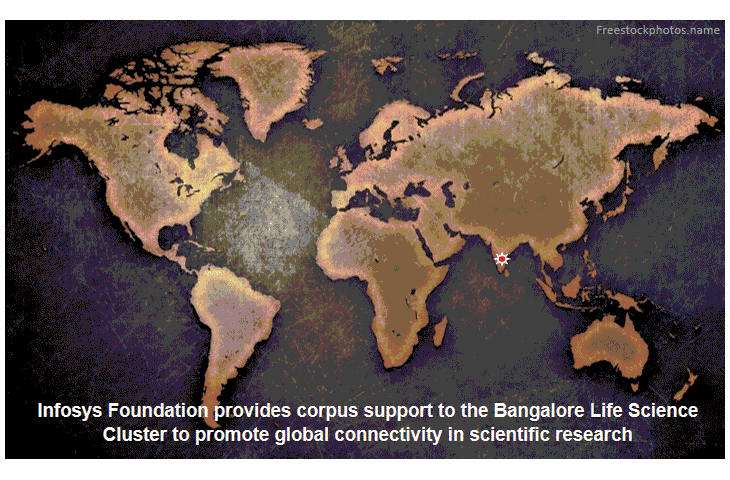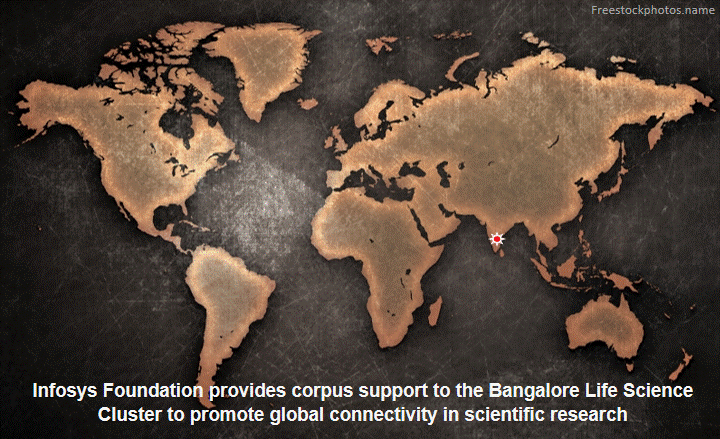When Nagaraju Dhanyasi began his doctoral work at Prof. K. VijayRaghavan's laboratory, he was interested in using microscopy to study the process of muscle formation. Early on, he realised that he would need to rely heavily on Transmission Electron Microscopy (TEM) techniques for his work, since it provided the high resolution power required to tease apart the process he wanted to understand. However, during this time, the National Centre for Biological Sciences (NCBS) had only just acquired an electron microscopy (EM) facility. "I was actually one of the first batch of users at the NCBS EM facility", says Dhanyasi. "At that time, we had very little guidance on how to prepare biological samples, to gauge the quality of the images, or even in interpreting the images we acquired. Was the image a true representation of an interesting phenomenon, or simply an artefact? We didn't know", he adds seriously.
This problem inspired Dhanyasi and Prof. K. VijayRaghavan to seek expert help in TEM from institutes abroad. The Weizmann Institute of Science in Israel became a natural choice due to their world-class TEM facility and an ongoing collaboration with a group there. Dhanyasi then spent two years at the Weizmann Institute learning about TEM and applying this knowledge in understanding myoblast fusion - which incidentally, was published in a paper last year. Meanwhile, the NCBS EM facility continued to grow and develop at its own pace. When Dhanyasi returned to NCBS, however, he brought back a very valuable resource - himself - as an experienced TEM user who had been trained at one of the best facilities in the world. "Once I was back, I was happy to contribute. I have been helping people at our EM facility with tips on managing reagents, in improving protocols, and acquiring skills in sample sectioning, which is a very technical procedure", says Dhanyasi. "I have also been training users from other laboratories and helping them with analysing images, so that many people from this campus can benefit from my knowledge", he adds.
Dhanyasi's experience is a common one in the field of science. Some of the best ideas in research are often generated through an exchange of knowledge and people that help institutes like ours grow and improve their facilities. The philanthropic arm of India's IT giant Infosys, the Infosys Foundation, is now extending much-needed support in encouraging international travel and collaboration amongst researchers. The Infosys Foundation has now provided Rs. 5 crores as corpus funding to the Bangalore Life Science Cluster, for 35 early career researcher travels awards each year for international travel and stay at research laboratories outside of India. The Bangalore Life Science Cluster is composed of three premier centres for biological research - the National Centre for Biological Sciences (NCBS), the Institute for Stem Cell Biology and Regenerative Medicine (inStem) and the Centre for Cellular and Molecular Platforms (CCAMP).
As NCBS enters its 25th year, it is in many ways, a 'Coming of Age' for the once-tiny research centre that now boasts more than 30 faculty members and upwards of 400 students and post-doctoral researchers who pursue science under its aegis. NCBS has been the nucleation centre for the Bangalore Life Science Cluster which now also includes inStem and CCAMP. One of the foremost characteristics that define the science at NCBS and the Cluster, apart from its excellence, is the open and collaborative atmosphere within which it is carried out. To encourage this environment as it matures, the Cluster is in the process of creating an Endowment Fund that will provide flexibility in financing projects that require researchers to interact with laboratories worldwide to further their work.
"Science is a globalised activity. Though the Cluster is small, we do excellent science because we are in constant dialog with the best science being done internationally. Central to this is our ability to share our work and collaborate with colleagues from around the world", says Dr. Mukund Thattai, the Head of Academic Activities at NCBS and inStem. "The travel awards supported by this donation from the Infosys Foundation will allow us to maintain and grow these crucial international connections, so we can continue to be at the forefront of research in the life sciences", he added.
Of the 400-odd students and post-doctoral researchers at the Cluster, roughly 100 travel abroad every year to attend conferences or to spend time with the research groups of scientists who collaborate with a faculty member from this campus.
"I believe that my stay abroad was a real eye-opener for me. I learnt a lot of molecular and microscopy techniques that were not only needed for my work, but were also immensely useful for other colleagues within the group. Most importantly, I also gained confidence in discussing and presenting my own work on a global platform", reminisces Priyankana Mukherjee, who like Dhanyasi, spent time at the Weizmann Institute during her doctoral studies.
"In India, we conduct science in a certain way - visiting Stanford opened my eyes to the ease and speed with which things can be done. An environment of that kind stimulates you to think unconventionally and without boundaries; and you carry the lesson forever. Such exposure fundamentally changes your approach to performing research, I believe, for the better.", says Tejas Gupte, a former post-doctoral fellow from inStem who spent three months at Standford University.
The travel support from the Infosys Foundation will be a tremendous opportunity for students and post-doctoral researchers at the Cluster campus to broaden their horizons, train in the latest research techniques worldwide and make new connections. These interactions are crucial, not only for the flow of expert knowledge into the Indian scientific community, but also for researchers to gain an understanding of their work in the context of global science.
"As we continue to strive for excellence at our campus and build a globally competitive scientific environment, we must continuoulsy engage with the best in the business. Many a time, this means going to international scientific meetings, colloquia and workshops and laoboratories abroad. This is because often the centre of research in the different areas that we address are not all at our doorstep. What better way to gain such an engagement and traction in the international arena of science than sending our students and post-doctoral fellows to attend meetings and workshops abroad and engage with the best laboratories globally? Infosys itself is no stranger to engaging globally while acting locally, and we are particularly delighted at this generous corpus fund from the Infosys Foundation to help us in this endeavour of ours", says Prof. Satyajit Mayor, Director of NCBS and inStem.
Speaking about the grant, Sudha Murty, Chairperson of Infosys Foundation said, "We firmly believe that Research in areas such as Science and Mathematics is critical to a nation's development. To build a sustainable economy, there is an urgent need to usher in a transformative student intelligentsia. This partnership with the Bangalore Life Science Cluster will enable us to facilitate a global environment for students - the future leaders, and amplify their horizons. In today's interconnected world, educational and cultural exchanges are necessary; the focus is on students as global citizens as we move into a borderless world."











0 Comments